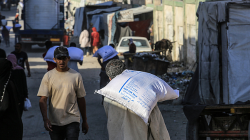UN Reports Gaza Humanitarian Crisis at Worst Level Since War Began
UN warns Gaza's crisis amid airstrikes, malnutrition, and displacement reaches unprecedented severity since October 2023 escalation.

The United Nations has issued a dire warning about the situation in Gaza, labeling it as the most catastrophic humanitarian crisis since hostilities erupted in October 2023. The latest assessment paints a bleak picture of a region battered by relentless airstrikes, mass displacement, and rapidly deteriorating living conditions. Public order has eroded significantly, with aid distribution hampered by insecurity and looting.
According to the UN Office for the Coordination of Humanitarian Affairs (OCHA), only five truckloads of aid managed entry into Gaza on Thursday—marking the first successful delivery in four days. These trucks, carrying critical medical supplies designated for a field hospital in Deir Al-Balah, faced additional tragedy when most of their contents were looted shortly after arrival. Meanwhile, intense hostilities forced another 60 trucks waiting at the Kerem Shalom crossing to turn back, highlighting the perilous environment for both civilians and aid workers.
“Humanitarian needs have exploded in Gaza,” stated an OCHA spokesperson, referencing nearly 80 days of total blockade. The scant aid that does make it through is woefully insufficient for the 2.1 million residents who now depend almost entirely on external assistance to survive. Despite immense operational challenges and strict limits on what aid can enter, UN agencies and their partners continue efforts to reach those most in need.
The instability has also affected healthcare infrastructure. Al Awda, the last partially operating hospital, was forced to evacuate after repeated strikes in its vicinity. Additional attacks further south in Deir al-Balah and within Al Bureij and An Nuseirat camps have escalated fears for civilian safety. A recent strike reportedly killed nine family members of a journalist in their home and injured over a dozen others.
Aid worker casualties are rising, compounding the crisis. An international organization reported the deaths of five staff members and injuries to two others as they operated community kitchens and nutrition points in Gaza. OCHA emphasized the urgent need for protection of civilians and humanitarian personnel, stating unequivocally that “aid workers must always be protected.”
Displacement continues on a massive scale, with almost 200,000 people uprooted in just two weeks. New orders from Israeli authorities have expanded evacuation zones, now covering approximately 30 percent of Gaza’s territory—including vast swathes of North Gaza, eastern Gaza City, and Deir al-Balah. Nevertheless, OCHA noted that many people on the move are driven by an urgent search for food and basic necessities rather than official directives.
Efforts to provide shelter are underway; emergency kits were recently distributed to familes as part of an initiative to pool resources and address acute needs. However, lawlessness jeopardizes aid effectiveness. Recent incidents saw armed groups storm a field hospital warehouse, seizing vital medical and nutritional supplies intended for malnourished children. “It is critical that those responsible be held accountable,” stressed OCHA, calling for more aid to be allowed into Gaza and safe distribution mechanisms to reduce the likelihood of looting.
OCHA reiterated that under international law, Israel, as the occupying power, bears primary responsibility for restoring public order and facilitating humanitarian assistance. The agency called for the admission of civilian police operating under internationally recognized standards and urged a decisive, lawful response to criminal behavior. Furthermore, OCHA and the broader humanitarian community repeated demands for a full lifting of the blockade and comprehensive measures to address the underlying causes of deprivation in the territory.
Simultaneously, the West Bank faces mounting challenges. Settler violence is surging, with more than 220 Palestinians injured so far this year—an average rate not seen in two decades. Following new settlement outposts, entire communities like the Bedouin of Maghayer ad Deir have been forcibly displaced. Continuing military operations have created movement restrictions, disrupting healthcare, education, and livelihoods for nearly 90,000 Palestinians in the Salfit governorate. Prolonged detours and increased transportation costs have become daily obstacles.
As the crisis deepens, the international community is urged to act swiftly to ensure safe, unimpeded access to critical services for civilians in both Gaza and the West Bank. Meeting these basic needs amid ongoing conflict remains among the most urgent humanitarian priorities.




